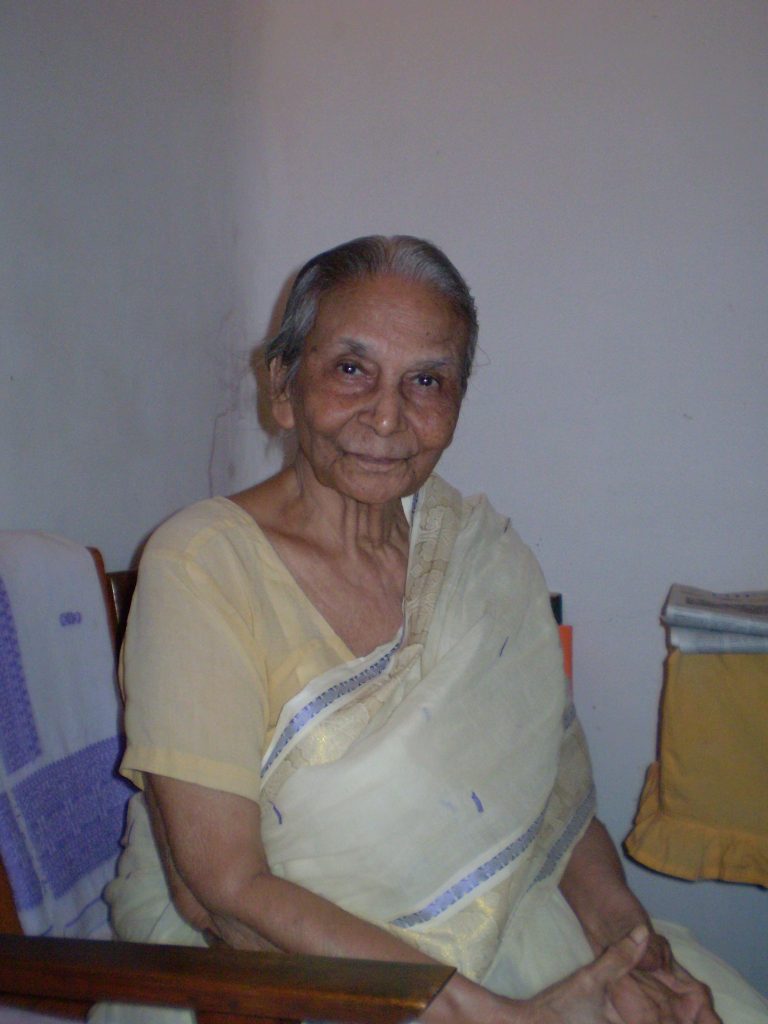
Dear Friends,
On Wednesday, 31 July 2019, the Aurobindonian community lost a great music maestro and a creative genius with the passing away of Shobha Mitra at the age of eighty-five. She belonged to the rare class of composers who believed in the philosophy of ‘Art for the Divine’s sake’ instead of ‘Art for Art’s sake’. She had learnt music from the likes of Dilip Kumar Roy and Sahana Devi and had kept the glorious legacy of Sri Aurobindo Ashram Music alive with her soul-touching compositions.
Shobha Mitra was born on 14 December 1933 to Amarendranath and Ashalata Mitra. She was the youngest of four children. She hailed from a well-known but orthodox family of north Kolkata whose presiding deity was Lord Narayan. Regular religious activities revolving around the deity made young Shobha quite devout even before she had entered into her teens. However, on 15 August 1940, a catastrophe struck the Mitra family when her third elder brother — who was then aged twenty-three — passed away of typhoid. The death of a young son naturally shocked the entire family but it was Ashalata, his mother, who was affected the most. Though she was reserved by nature but the passing away of her youngest son made her even more silent; she neither spoke nor cried but attended to her household duties in absolute silence. One of the neigbours of the Mitra family suggested that Ashalata should be taken to the Ashram of Sri Aurobindo at Pondicherry where she might feel better. Accordingly, in August 1941, Ashalata visited the Sri Aurobindo Ashram with her eldest son Arunendranath and had the Darshan of Sri Aurobindo and the Mother. When she returned to Kolkata, everyone was surprised to see that she was back to her normal self and that a stupendous serenity was observed on her face. Young Shobha came to know from Arunendranath that the Mother of Sri Aurobindo Ashram had told Ashalata that her late son was with Her so she must not feel sad for him. Thus the entire family was drawn to Sri Aurobindo and the Mother and accepted Them as their Guru.
In August 1942 Ashalata visited Pondicherry again; this time her younger son Robi and Shobha (who was then aged nine) accompanied her. They reached Pondicherry on 9 August and had the Darshan of the Mother in the same evening. Prior to her visit to Pondicherry, Shobha had dreamt one night that she was standing on the shore of a sea and a European lady clad in white was swimming in it and asking Shobha to join her. When she woke up, Shobha felt that the face of the European lady resembled that of the Mother’s. When she met the Mother in the evening of 9 August, she at once recognized Her as the one whom she had seen in her dream. About her first Darshan of the Mother, Shobha recalls in her memoirs:
‘With that marvelous smile of Hers She stretched out both Her arms towards me. I ran up the stairs and fell at the Mother’s Feet. Like soft lotus were her rose-coloured Feet! How long I remained with my head on those Feet, I do not recollect. Then the Mother raised me up with both Her hands… then She lifted my chin and kissed me on my forehead! I have no memory of what happened afterwards or how I came down… Perhaps on that day, at that very instant, I had received my initiation from the Mother.’ (Living in The Presence, p. 8)
Two days later, Shobha was permitted to participate in the evening meditation which took place in the Ashram courtyard.
In 1943 when Shobha visited the Ashram again with her mother and elder brother, the desire to dance before the Mother arose in her tender heart. But she was dissuaded from approaching the Mother with her request by many of the inmates who had dismissed her ardent aspiration as a child’s whim. But when Shobha conveyed her request of singing and dancing before the Mother to Nolini Kanta Gupta, the latter replied that he would ask the Mother and let her know. The next day Nolini Kanta informed Shobha that the Mother had granted her prayer. Shobha was told that the Mother would appear on the balcony situated in the first floor of the Ashram main building (from where She gave Darshan every morning till 1962) and Shobha could sing and dance at the entrance to the house where Mridu, Sri Aurobindo’s cook, stayed (this house is presently known as ‘Prasad House’). But Nolini Kanta cautioned that the songs and the dance must not be too long because the Mother would see her from the balcony standing. On the next day, at 9.15 a.m. Shobha performed before the Mother who came to the balcony with Nolini Kanta and Pavitra. After her performance, Shobha walked to the balcony to seek the Mother’s blessings. The Mother leant forward and said with a beatific smile: “It was very good.”
Shobha continued to visit Pondicherry with her elder brother and mother till 1950. On 24 November she had her most memorable Darshan of Sri Aurobindo. While standing at the queue, she noticed that Sri Aurobindo was looking at her through the moving line. To quote her own words: ‘I too had my eyes fixed on Him. So engrossed was I in Him that I hardly realized when the two persons before me moved. I looked fixedly at Him while He looked into me. I just placed the garlands before Him but, as if mesmerized, could not take away my eyes from Him. Usually, we used to stand before Him for an instant or two at the most. One single look of His would give us such a profoundly moving experience at the physical level. After Sri Aurobindo had looked for a moment at a person, He would turn His gaze at the next person. This was the signal for us to move away from His physical Presence. I do not know what happened this time. I felt Sri Aurobindo kept His gaze fixed on me for a long time without turning away. Quite evidently this experience of “a long time” must not have been longer than a few seconds but one thing is certain: this year’s darshan of Sri Aurobindo lasted a little longer than that of the previous years. I felt His total concentration on me without any kind of distraction. Sensing that the line had stopped moving behind me, I began retreating with my eyes still fixed on Him, in order to go out of the Darshan room. I still felt Sri Aurobindo’s eyes focused on me. Now I was near the door and almost out of the room. I saw Him close His eyes gently as if indicating that I could now go. During this darshan, I experienced a marvellous, deep concentration in Sri Aurobindo’s gaze which I cannot communicate in words… A few days later, on the morning of 5th December, I heard on the radio that Sri Aurobindo had left His body. At once before my eyes, the memory of that last darshan welled up from my being. I would never see Him in the physical body again. I felt that He had blessed me in that unbelievable way before leaving this physical world and my heart spilled over with infinite gratitude at His Grace.’ (Living in The Presence, pp. 23-24) Shobha rushed to Pondicherry with her mother and two elder brothers and stayed till Sri Aurobindo’s coffin was put to rest in the Samadhi vault.
In early 1951 Shobha’s marriage was fixed by her father, Amarendranath. At that time, Shobha was studying Intermediate Arts at the Scottish Church College which she had joined after passing her matriculation examinations from St. Margaret School. However, she was not keen to get married. Moreover, when she was in her sixteenth year, the Mother had told her: “Don’t marry. You have a sensitive nature and you are very sincere in your feelings. Once you get married you won’t be able to come out of it.” She had also told Shobha to send a telegram to Her if her father decided to fix her marriage. But suddenly one day, Shobha received an unexpected note from Nolini Kanta Gupta in which he wrote: “The Mother has asked you to come at once. The Mother sends you Her blessings.” It seemed that the Mother had sensed what was happening in Shobha’s life.
This was the call Shobha was awaiting. On 13 June 1951, Shobha and Ashalata left their house much to the chagrin and grief of Amarendranath and boarded the train to Pondicherry. On 15 June they arrived at the land of their dreams. The Mother provided them accommodation in a big house named ‘Red House’ which was situated on the opposite of Sri Aurobindo Ashram Library. On 16 June Shobha met the Mother at the Meditation Hall on the ground-floor of the Ashram main building. The Mother was seated on Her chair; seeing Shobha She stretched Her arm, took her hands and kept them on Her lap. With Her eyes focused on Shobha, She said: “So you have come here for good?” Shobha replied in the positive. Soon Shobha was given work in the Publication Department under Prithwi Singh Nahar.
In 1952 Shobha and Ashalata were accepted as permanent inmates of Sri Aurobindo Ashram. On 16 December when the new session of the Sri Aurobindo International Centre of Education started, Shobha joined it and studied French, English, Indian and Western Philosophy along with some of Sri Aurobindo’s major works like Savitri, The Human Cycle and The Ideal of Human Unity.
Before joining the Ashram, Shobha had learnt music at a school named ‘Sangeet Sansad’ where different styles of music like classical, folk songs of Bengal and devotional songs were taught. She had also learnt the dance-form of Kathak from a student of the illustrious dancer, Shambhu Maharaj. During her annual visits to the Ashram, she continued to take lessons in music from Sahana Devi and Dilip Kumar Roy. She also learnt dance from Anuben Purani, daughter of Ambalal Balakrishna Purani. Needless to say, music and dance became a grand passion for her.
In March 1954, the Mother asked Shobha to prepare a dance-recital for the Darshan of 24 April. Shobha approached Chandana Banerjee (wife of Sanat Banerjee, the erstwhile Indian Consul at Pondicherry when the town was a French territory) with the request to play some compositions on her guitar based on which she prepared her dance. On 24 April, Shobha performed before the Mother in the Ashram Playground while Chandana Banerjee played Western melodies on her guitar. After the performance, the Mother told Shobha: “You danced well. I liked it. What I liked best was that your whole body was dancing gracefully and in perfect rhythm. Your postures and movements were natural and effortless. I really liked that.”
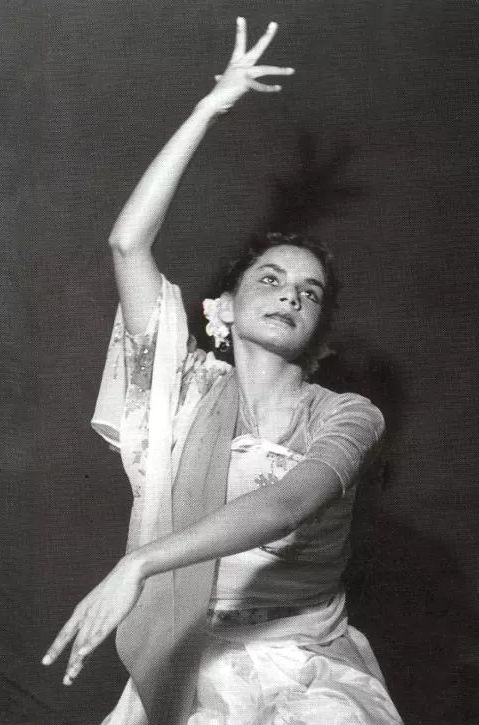
On 14 December 1952 — Shobha’s nineteenth birthday — when she went to meet the Mother, She gave her a flower which She had named ‘Promise of Realization’ and told her: “O my dear child, a portion of the goddess of Beauty is present in you.” Two years later, when Shobha turned twenty-one, the Mother gifted to her two books autographed by Her. One of the books was Sri Aurobindo on Himself and on the Mother. When she opened the first page of this book, she saw that the Mother had written “To Savitri, with blessings” on it. Shobha was surprised. She wondered why did the Mother write the name of ‘Savitri’ instead of her own name. On the following day, she went to Nolini Kanta Gupta, showed him the book and said: “Mother gave me this book yesterday. Just see the name She has written by mistake.” Nolini Kanta replied: “Is the Mother human that She can make a mistake? There can be many reasons for Her to write this.” Shobha then went to Champaklal, the Mother’s faithful servitor, and showed the book to him. Champaklal told her: “You are most fortunate. The Mother has never given such a name to anyone before. You are exceptionally fortunate.” As neither Nolini Kanta nor Champaklal could enlighten her, Shobha decided to approach the Mother directly. One day, she asked the Mother: “Why did you give me this name?” The Mother looked at her for a few seconds and then said: “One day, you will understand. Keep it as your sacred name.”
Shobha’s performances at the 1st December programmes earned the Mother’s praise. For the 1st December programme of 1955, the Mother had chosen Shobha along with Arati Dasgupta and two others to recite ‘Ascent’ and ‘Descent’, two poems penned by Sri Aurobindo. Prior to this programme — which was organized at the Ashram Playground — Shobha asked the Mother whether Sri Aurobindo came to attend any cultural events which were associated with Him. “Yes,” the Mother answered, “If you call Him, He comes. But that call has to be sincere.” While reciting her lines during the programme, Shobha suddenly saw two hazy feet on the grey-coloured wall in front. She felt as if Sri Aurobindo was standing, clad in a dhoti worn in the Bengali style. But before she could look at the upper part of His body, He vanished. After the programme ended, when Shobha went to meet the Mother, She said: “Your recitation was fine! While your inner being was having that experience, your outer being continued with the recitation. You did not make a single mistake in the recitation. You did well.”
Once, a dance-drama titled Mahishasurmardini was selected for the 1st December programme. The dancers were chosen by the Mother Herself! Shobha was chosen to play the role of Mahakali while Anuben Purani, Gauri Pinto, Light Ganguli and Jhumur Bhattacharya were selected to play Durga, Maheshwari, Mahalakhsmi and Mahasaraswati respectively. Shobha, however, was not quite comfortable to play the role of Mahakali. One day she went to the Mother and said: “How can I act as Mahakali when the real Divine Mother is present before me?” The Mother replied: “Try and gather all the force within you. Now channelize this concentrated force on all those weaknesses in your nature you are conscious of, so that these are destroyed. Try and destroy the limitations from your nature. I think this will help you.” At the time of the performance, Shobha’s dance was extraordinary. Later she had reminisced that a power had descended into her body due to which even after the programme was over, she continued to tremble uncontrollably. When she was taken to the Mother, She held her arms and continued to hold her for quite some time. When Shobha became normal, the Mother placed Her right hand on her head and said: “Do you know what you have done, my dear child? You have invoked Mahakali’s presence in your body! It was very good, my child! It was very good!”
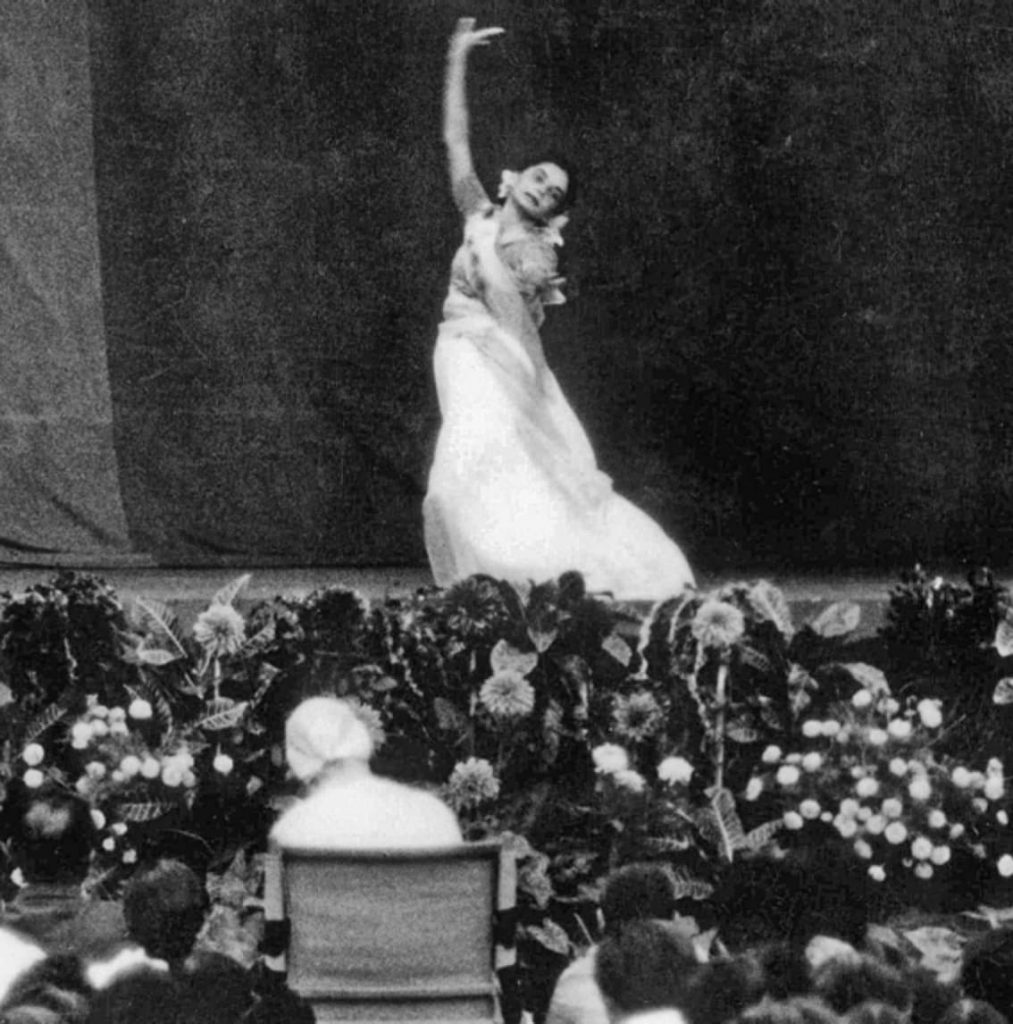 Shobha performing before the Mother
Shobha performing before the Mother
Years later, when Shobha had staged The Rhythm Eternal in May 1967 (which she had to repeat thrice in the same week), the Mother had told her: “My dear child, do you know what you have done? You have conquered the impossible. I knew that you were capable of this.”
On her 30th birthday in December 1963, when Shobha went to the Mother, she prayed to Her: “Make me one of the noblest of human beings.” In response to her prayer, the Mother wrote on her birthday card: “Happy Birthday to Shobha! With my blessings for the realization of your highest aspiration.”
In 1957, following the Mother’s instruction, Shobha joined the Sri Aurobindo International Centre of Education as a teacher of French. Initially she was hesitant to teach but the Mother assured her that by taking classes on French, not only would she learn the language more but it would also develop her personality. “I have selected you for this because you will progress a lot through this,” the Mother had said. On another occasion, the Mother wrote to her: “You are a good teacher and with a sincere effort you can progress and become an even better teacher.”
Shobha also played a pivotal role in organizing programmes of visiting artists — a charge given to her by the Mother — who came to the Ashram on various occasions. Among the artists whose programmes were organized by her were Birendra Kishore Roy Chowdhury, Tara Ghosal, Jyotsna Bhole, Pankaj Kumar Mullick, Chandralekha (the famous Bharat-natyam dancer), Raghunath Panigrahi, Bhubaneswar Mishra, Sanjukta Panigrahi, Nandita Mohanty, Kartik Kumar to name a few. She was also entrusted by the Mother with the responsibility of organizing monthly programmes with the Ashram singers under the title of ‘Sangeet mala’ when its original initiator gave it up. However, after it was successfully executed for a couple of years, ‘Sangeet mala’ was stopped following the Mother’s wish.
In 1964 Shobha had dramatized Sri Aurobindo’s The Hour of God into English which was staged on the 1st of December. She had divided it into three parts; in each part she had included extracts from Sri Aurobindo’s other writings. Sunil Bhattacharya composed the music for The Hour of God. The Mother, too, had recorded it in Her own voice. The programme became a memorable one for its outstanding execution.
On 14 December 1965, on the occasion of Shobha’s 32nd birthday, the Mother told her that She was going to start a Music Section in the Ashram with her as its in-charge. The Music Section was eventually started in the verandah at the entrance of ‘Red House’ where Shobha stayed. Later it was shifted to the Dancing Hall annexe. Kirit Joshi, the erstwhile Registrar of Sri Aurobindo International Centre of Education, procured various musical equipments needed for the Music Section which took shape quite swiftly. Pupils of all age group joined it. Soon Shobha had to give up her work at the Publication Department so that she could devote more time to this newly created section which went on to become a very important part of her life.
After some years of teaching music in the Ashram, Shobha realized that she had exhausted her collection of songs. One day she requested the Mother to kindly allow her to go out of the Ashram for some time so that she could acquire some more training in music. The Mother was visibly angry and said forcefully: “Why can’t you understand that music is within you?” Saying so, she tapped twice on Shobha’s bosom. On another occasion, She had told Shobha: “What I want from you is music, but the music that flows from your soul. I want to see you create your own music.” When Shobha said that she had no idea about composing music, the Mother assured her: “When I give someone a responsibility, I also give that person the force to carry it out.”
And indeed a miracle happened! One evening when Shobha had returned home after attending to her sports activities, suddenly she felt a descent of incessant flow of melodies. It seemed as if the door to the world of music had been thrown open! Thus the composer in Shobha took birth. In the following several decades, she composed hundreds of soul-captivating songs. In 1972, on the occasion of Sri Aurobindo’s Birth Centenary, she conceptualized a special programme titled Sri Aurobindo and the Mother on India and Her Future. In that very year, a long-playing record of her musical compositions titled Loving Homage was brought out by Sri Aurobindo Society. Her memorable compositions include titles like Adoration, All We Owe to Thee, Aspiration, Century’s Salutations, Durga Stotra, Esho Gahi Gaan, Invocation to Mother India, Laha Pronam, Our Gratitude, Om Namo Bhagawate, Salutations, Towards a Luminous Future, Vandanam and Versun avenir lumineux (the last being a musical presentation on the occasion of the unveiling of Sri Aurobindo’s statue at UNESCO, Paris, on 16 September 2009). Her music is a living testimony of the fact that they originated from a higher, spiritual world. She was, till her last day, the face of the Ashram music.
After Auroville was inaugurated, Shobha was chosen to conduct singing classes at Auroville on every Saturday. Her classes went on for a number of years.
Shobha always wanted to transform herself. She took it as the mission of her life. She would tell the present author: “I want to become a transformed person.” On three occasions, she had asked the Mother whether she would be able to transform herself and on all the three occasions, She had replied in the affirmative. On the last occasion, She said “Yes” three times quite forcefully and added: “When I say something, I also put into it the necessary force for it to be realized.” And She said to Shobha: “Have faith in me, my dear child. It is bound to happen one day.”
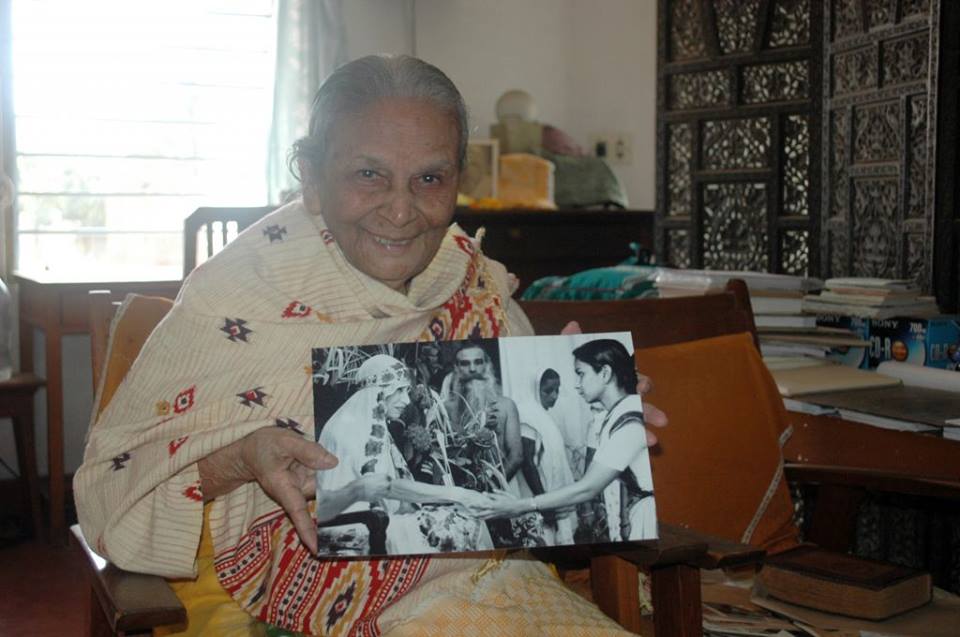 Shobha Mitra with a photograph of her with the Mother
Shobha Mitra with a photograph of her with the Mother
In 2012, Shobha Mitra’s much awaited book of reminiscences of the Mother titled Shri Mayer Divya Sannidhye was published. The English translation of this book titled Living in the Presence was published in 2013. In that very year, in the month of August, she was awarded with the prestigious ‘Sri Aurobindo Puraskar’ by Sri Aurobindo Bhavan, Kolkata. Around 2013, Shobha Mitra started working on a project called ‘MA’, that is, ‘Musical Archives’ which aimed to house songs composed on Sri Aurobindo and the Mother in various languages. On 28 December 2014, Overman Foundation presented her with the ‘Auro Ratna Award’ for her invaluable contribution in the field of music. This award ceremony was held at the ‘Hall of Harmony’ and hosted by Sri Aurobindo International Centre of Education.

 Shobha Mitra being presented with the “Auro Ratna Award” by Manoj Das Gupta, Managing Trustee of Sri Aurobindo Ashram Trust. Also seen with them: Krishna Chakravarty, Deepshikha Reddy and Anurag Banerjee
Shobha Mitra being presented with the “Auro Ratna Award” by Manoj Das Gupta, Managing Trustee of Sri Aurobindo Ashram Trust. Also seen with them: Krishna Chakravarty, Deepshikha Reddy and Anurag Banerjee
The present author had the great privilege of enjoying Shobha Mitra’s abundant love and affection for more than a decade. The deep bond which existed between them was a treasure to cherish. She would recall to him the memories of what could be called the golden era of Sri Aurobindo Ashram. She also shared with him many interesting anecdotes which she did not mention in her book of memoirs, Shri Mayer Divya Sannidhye. In fact, the present author was fortunate enough to hear her read out the chapter of ‘The dance of Mahakali’ from the manuscript of this book way back in February 2009. Her suggestions and guidance have always contributed immensely for the growth of the present author as a person. Whenever any new CD of her compositions would see the light of day, she would send a copy to him as a gift. In fact, he was among the invitees present at her recording studio in November 2018 when her last album of Bengali songs was officially released. A very interesting aspect of her personality was that she never bore any grudge against those who had hurt her. She had the generous heart to forgive them.
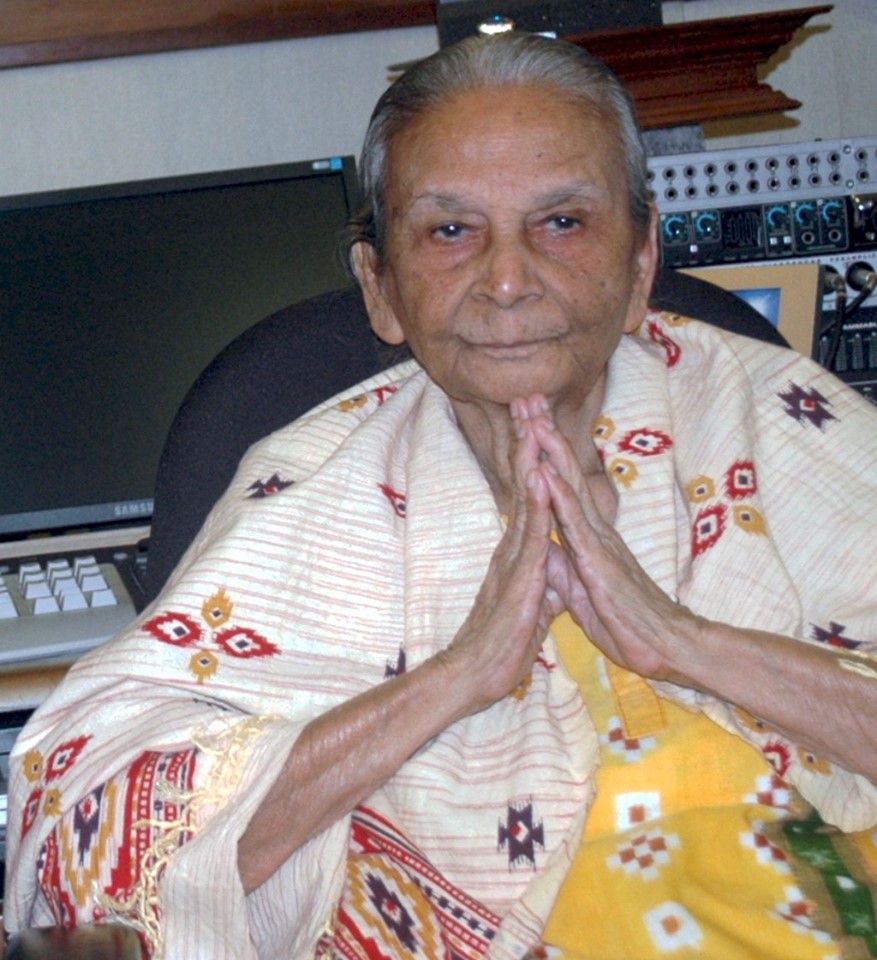
When the shrine of Overman Foundation was being re-constructed, Shobha Mitra had gifted a rarest of rare treasure to the said organization as her offering. In August 2018, she had told the present author that she was organizing a musical soiree dedicated to the stalwarts who had developed the Ashram music. This programme which was organized in the courtyard of Sri Aurobindo International Centre of Education was met with stupendous success. She had spent several months arranging it. On the eve of the programme, when the present author rang her up to convey her best wishes, she said that this was going to be her last major programme in the Ashram.
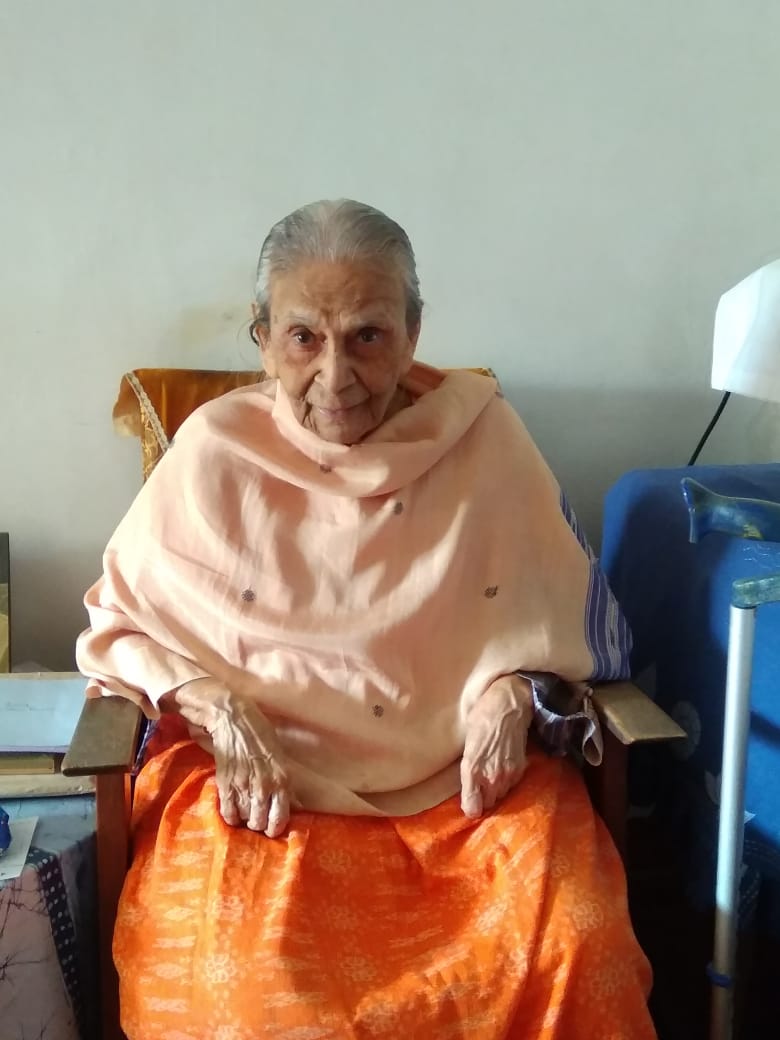
In November 2018 she had told the present author at her residence that she was keen to know what happened in the other world after death and that she wanted to see the Mother in all Her four aspects before her final departure. In February 2019, the present author came to know that she was unwell and admitted to Desiree Home where the senior but ailing members of the Ashram are housed. He rang her up and came to know that she was facing some breathing problems due to which she was advised by the physicians to shift to Desiree. The present author flew to Pondicherry to be with her. From 3rd March to 11th March, he met her daily at Desiree Home and spent an hour in her delightful and loving company. She was, at that time, working on her book of notations. She told the present author that she would like to complete preparing the notations for posterity before she left. She was requested not to think of death as she still had a lot of work to do. “Nothing will happen to you”, he assured. She smiled and said: “Let’s be practical. This body is becoming frail.” In the evening of 11 March 2019, the present author bid adieu to his beloved ‘Shobha-di’. But who knew that it would be his last meeting with her! Who knew he would never be able to see her smiling face radiant with the warmth of love!
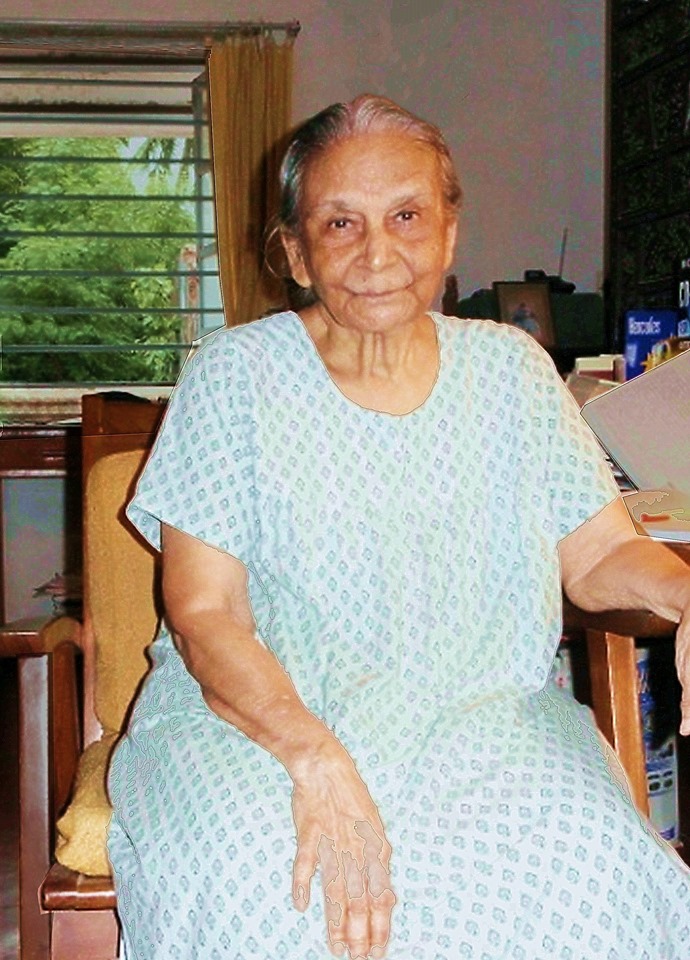
In the evening of 16 July 2019, the present author had a brief talk Shobha Mitra over the phone. When he inquired about her well-being, she said that she was more or less all right. She told him that she was going to organize a musical programme in August and was in a meeting to discuss the details of the event. She said that she would call me back later. That was the last time they conversed.
A few days later, Shobha developed a mild fever. The temperature did not shoot up but persisted for a few days. But her tongue had lost all sense of taste. She was taken to a cardiologist for regular check-up. When the doctor was informed that she had developed some mucus in her lungs, she was given an anti-allergy medicine which she was asked to take for five days. She took only one doze but from the very next day she was found to be sleeping for almost twenty-two hours a day. This went on for three days. She had to be forced out of bed and served some coconut water as she hardly took any food. When her medical reports came, it was observed that she was suffering from urine infection. The treatment was started immediately but the drowsiness continued for quite some time. On Saturday, 27 July, Narendra Patel, a devotee of Sri Aurobindo and the Mother, visited her with his wife and gifted to her two booklets titled First Darshan of the Mother and Glory of Darshan. Shobha held the booklets in her hands and showed the photographs of the Mother adorning the title pages to her attendant with a loving smile. Later she went to the washroom to relieve herself. But when she did not come out even after two hours, the nurse went in and saw that her legs were not working. She also had lost sense of time. With the help of Ashok Acharya, who had grown up in her loving guardianship, she was brought back to her bed. When it was proposed that she should be taken to the Ashram Nursing Home, Shobha declined. After much persuasion she was taken to the Ashram Nursing Home. On Sunday, 28 July, she took some food from the Dining Room. It was the first full meal she took in the past few days. Around nine o’clock in the morning she lost consciousness which she regained in the afternoon of 29 July. She could recognize people who stood around her. She repeated the names of Ashok Acharya and Manoj Das Gupta (the Managing Trustee of Sri Aurobindo Ashram Trust) and also called out ‘Ma, Ma’ a couple of times. To someone who stood near her, she asked: “Am I already dead?” She was assured that nothing had happened to her. “I don’t want to die!” she said. It was also reported that she had remarked that she was always thinking of the Mother and that she saw a beautiful golden light. Then she again lost consciousness. And on Wednesday, 31 July, she left her body at 8.35 a.m.
With Shobha Mitra’s demise not only did the Ashram community lose a senior member but the Aurobindonian community across the globe too lost a stalwart whose life acted as an inspiration to many. But she — whom M. P. Pandit had called a “worthy child of the Mother” — cannot die — she is not dead. She has only cast away her frail physical sheath. She has just passed on to the other world leaving behind a rare legacy. She has been immortalized by her compositions. And she would continue to live in her creations and in the hearts of those whom she loved and who loved her.

Rare to find such a devoted and dedicated soul in the spiritual history of the Ashram:
a versatile and many-sided personality, Shobha di endeared herself to all those who came in contact with her.She radiated an atmosphere of peace and harmony all around.One did not have to be Shobha di’s student to come under her influence and spell.When we heard the news of Shobha di’s passing, we felt that we lost a precious part of our upbringing in the Ashram. One will never forget her smiling face, full of affection and goodwill towards all.
She brought the love of music to the forefront of our attention: day after day and year after year.We marveled at the incredible manner she brought music [and dance] to the community,making music an inseparable part of our life in the Ashram, just like studies and sports.
Thank you dear Anurag for such a fine and deeply moving tribute!
Thanks for the tribute for such a great soul..
Reading was an experience itself.
One feels like living in Ashram itself….
Love & Regards.
Kuldip Suri
A wonderful portrait of our dearly beloved ” Shobha-di “-the true child of the Divine Mother Her life was a long saga of devotion , dedication and adoration – when ever we visited her residences she was always warmly welcoming with her disarming smile and sweetness – She reminded us sometimes of Mirabai – the divine minstrel who sang and danced for the Lord and Lord alone –
Thank you , Anurag for sharing this memorable tribute – She was truly ” Shobha ” of the Aurobindonian Community – grace and beauty personified –
Surendra s chouhan – SAICE ’69
We are blessed to have amongst us the children touched by Her!
JaiHeJaiHeBharatMata
The listening take you to a different silent spiritual world.
My Pranam to Reverred Mother
Thanks for the beautiful write up and also the two expressive photographs– expressive of the aspiration that she was carrying within her. Who would have thought the old lady I saw– a few times in the ashram– was so pretty in her youth? Even though the old lady was as lovely with the halo of a definite spiritual experience spread over her face.
I shall remain ever grateful to the Mother that She gave me the opportunity to come to a close-contact with Shobhadi who inspired me always for creative programmes. I learnt a lot from her, used her music several times for choreographic dance with her kind permission. I truly believe “Good music is that which penetrates the ear with facility and quits the memory with difficulty.” Shobhadi’s music always helps me to fly above, to soar high and feel the divinity. I adore her. May she rest in eternal peace.
She meant a lot to all students
… my prayers
She was my music teacher for many years. Our condolences to Arup-da & family. She will always be remembered & missed by all of us. Rest In Peace Dear Shobha di.
She not only taught music but was our English teacher as well. She first introduced us to Sri Aurobindo’s poems.
Wonderfully sweet person.
In the process of our growing up, during childhood, we all have a couple of elders who influence us more than others, Shobadi’s influence was one of the deepest on me, not only musically but humanly and spiritually, the latter, in a silent way..
Gratitude to you sweet Friend !
Here is for all of us just one of her compositions, to remember her in her Best:
https://youtu.be/waCP_pPLPNo
very sad to read this.. so many memories
She was so adorable and sweet, she had helped me get admission in SAICE, will miss surely….may her soul RIP
Wonderful French teacher. She will be missed always.
Shobha di You are now with Douce Mere. Tell her how grateful we are to Her to have given us in you a French and a Music teacher so dedicated till the last. Love from all of us
Extremely saddened to get this news. An epitome of motherly love n compassion always there for her students. My music teacher whom I revered a lot. RIP Shobhadi.
She was our gem of gem never would she put you down there was always a place in her heart for all of us even if you could sing she would make sure you took part in her programs. Will miss her very much.
Lovely memories of her encouraging me to play Tabla – and how she would cue giving me the Tala on the harmonium remain etched forever in my memories – what a kind soul, her beautiful smile and love for the children.. Pranams and prayers
Will always be my music Guru from whom I learnt a lot about music and life.
She will be missed… a beautiful and gentle soul. Taught me everything I know and love about music.
So much light and devotion in her eyes. Thank you for your presence . I have never met you but my heart recognizes you.
Had learned Rabindra Sangeet and nazul geeti from her for many years.
We will miss you very much Shobha di . Rest in peace.
Shobha di my dearest Teacher, not only did she teach me music… she taught me about life, nature, love spirituality through music. Her teachings were and are still an inspiration to me that guides me through life.
Gaaner bhitor diye jokhon dekhi bhubon khani…
Her voice and her delicate fingers on the harmonium will now be a loving memory for me. My final pranam to you Shobha di..
Extremely sad to hear about the passing of Shobha di. She was my first music teacher. May her soul rest in eternal peace.
Beautiful soul, a shining gem, love you Shobhadi, so many memories, Om namo Bhagavate. Your light will always shine in our midst.
Very very sad day for me, my initiator my mentor and my Guru to whatever little of music that I have learnt! My Pranam and gratitude for all the care and love you bestowed on us, not only as a music teacher but also as a guide to making us better human beings. An ideal child of the Mother that You yourself were!
Pronam, dear, respected, loving teacher. Deep gratitude for all that you gave so generously.
Will be ever grateful for and inspired by her efforts which have made our growing years replete with music in the light of the Mother’s guidance…
I knew Shobha-di (1952-1969) during my school days. But this article has shown me the real picture of her. Thanks for this revelation!
It was a wonderful piece of reminiscence and biography. Inspiring, her life. Much of her music -voice and composition has been special experiences.
Can I find an online version of Invocation and Salutation – Shobha Di’s composition?
Warm Regards
It was a sudden shock for me. Due to the Mother’s grace I got the fortune to meet her at the concluding phase of her mortal life. In my every darshan visit I exploit this great opportunity to visit her at her place and spend long time . She shared umpteen personal memory and opinion with me at the same time asked my personal view regarding many subjects. After our first I recognized her as the relative of my soul. Probably this reason I have placed her in a very upper tire in my mind just after my own mother. Here I must thank to Overman and its founder to offer her the ceremonial recognition that she deserves. The photographs of this article can become collectors item.